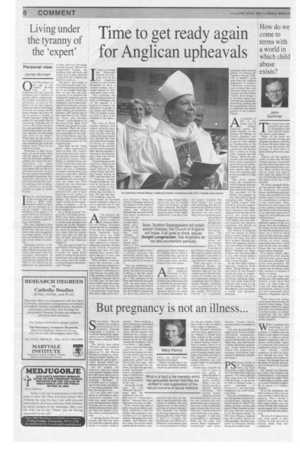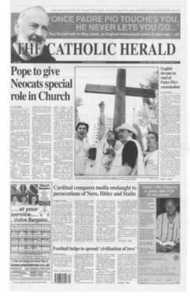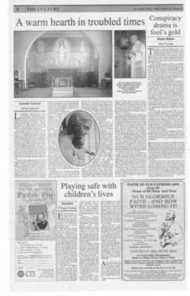Page 6, 14th June 2002
Page 6

Report an error
Noticed an error on this page?If you've noticed an error in this article please click here to report it.
Tags
Share
Related articles
Ordination Of Women Main Lambeth Topic
Unity Process Takes A 'step Backwards' With Female...
Episcopal Bishop Sees The Pope
Shared Hopes And Fears, But Still A Special Charism
Ex-anglicans Will Bring New Life To Our Church
Time to get ready again for Anglican upheavals
It looks as though the Episcopal Church of Scotland will be the first Anglican Church in the United Kingdom to have a woman bishop, and it might happen in little more than a year's time.
This weekend, the Scottish General Synod meet in Edinburgh, and on the agenda is a motion to remove all references to gender in the canons and ordinal. This will enable women as well as men to be ordained to the episcopate.
The vote to allow women bishops will almost certainly pass with a large majority. Over the last year the various diocesan synods have debated the issue and come down strongly in favour of women bishops. If the vote this summer gives the green light, then the measure is returned to the dioceses and a final vote will be taken next summer.
Female bishops in the Anglican Church are nothing new. The Episcopal Church in the United States had their first female bishop in 1978, and now there are 11 Anglican women bishops worldwide. The vote in Scotland this week reminds us that female Anglicans in pointy hats are here to stay. The fact that they will probably soon be consecrated in Scotland merely reminds us that it is not a question of if, but when, for the Church of England.
At the moment, the Church of England the
women to be ordained priest, but not bishop. Everyone admits that this is a nonsense. It can only be explained by being explained away. Women have not been allowed into the episcopate simply to please those who were opposed to women's ordination generally. Pundits in the Church of England predict that they will most certainly have women bishops in the next 10 years, and very probably before that. What troubles Catholics about this decision is the severe obstacle it presents to ecumenical efforts. The fact that women's ordination is a huge obstacle was made clear to the members of the Church of England General Synod 10 years ago. At that time each member received a copy of an open letter from the Pope and the Patriarch of Constantinople beseeching them not to make such a divi
sive decision. When the Church of England followed the majority of the Anglican Communion into this innovation she effectively declared that she didn't really care about ecumenism, at least in the crucial subject of valid orders. Some advocates of the change actu
ally said, "Justice is more impor tant than church unity." When it was complained to one proponent that it wasn't a catholic decision, she admittedly bluntly that she hated the Catholic Church and was glad not to be part of it.
One can understand a lay person not understanding the issues, but what is even more troubling is that the Anglican hierarchy don't seem to get it. The statement of the Pope and-Patriarch was quite clear, but then some years later when Pope John Paul II declared in his moto proprio that the Catholic Church did not have the authority to
ordain women, George Carey spluttered that he would "need clarification" of the Pope's statement. The Pope's statement was short and clear and to the point. What "needs clarification" is an idea of the episcopacy which claims to be Catholic, but in which a parish priest may opt out of communion with his own bishop and select another bishop of his own choice.
nother example of this Anglican blindspot is their response to the encyclical Dominus Jesus. Issued irithe millennium year to celebrate the proclamation of Jesus as Lord, the statement pointed out that churches that do not retain the historic episcopacy are
not "proper" churches. The word "proper" was a legal term indicating that they do not have the fullness of apostolic order. The rest of the document was very conciliatory and accepted the grace and salvation which flows through nonCatholic Christian denominations. The encyclical said nothing which was not already plain in The Catechism of the Catholic Church, and yet the Anglican leader said that the statement "cast doubt on the considerable ecumenical steps that have been taken".
Time and again in the ecumenical drama, the Catholics are portrayed as the bad guys. And yet very few seem to accept that the ordination of women was the most enormous setback for ecumenism since the Reformation. Despite a perfectly clear re-statement of the historic Christian position, in this matter, the Catholic Church is constantly
n example of this is the recent visit of a female Anglican priest, Dr Judith Maltby, to the Vatican. Dr Maltby, an Oxford chaplain, was asked to deliver a lecture as part of a new exhibit on Anglicanism at the Vatican. The press made a great fuss over the fact that a woman in a dog collar ventured into the Vatican. While she was greeted with calm diplomacy and ecumenical good will by the professionals at the Vatican, the news reports said, "The nuns were especially glad to see a woman in a dog collar!"
One could almost smell the scandalous whiff of female perfume penetrating the evil allmale club of the Vatican. The presence of Dr Maltby was pumped up into some kind of epoch changing event. "Experts" and "inside sources" were quoted to give the impression that the Oxford chaplain's presence was earthshaking. From the tone of the article, one would have thought that at the mere sight of Dr Maltby the entire Vatican machine was about to capitulate and decide to ordain women anyway.
The Church of England will not change its mind about women priests and before too long they will have women bishops too. When this happens, will we see a new influx of Anglican priests "coming home to Rome"? Perhaps not. Many of those who have been able to live with women priests will find some way to live with women bishops.
On the other hand, if those specially Anglican birds called "flying bishops" are shot down by the General Synod, the ways of compromise will finally turn into a cul-de-sac, and those Anglicans who really want to be Catholic may come at last into the barque of Peter. If that happens, let us give them a warm and generous welcome.
blog comments powered by Disqus













